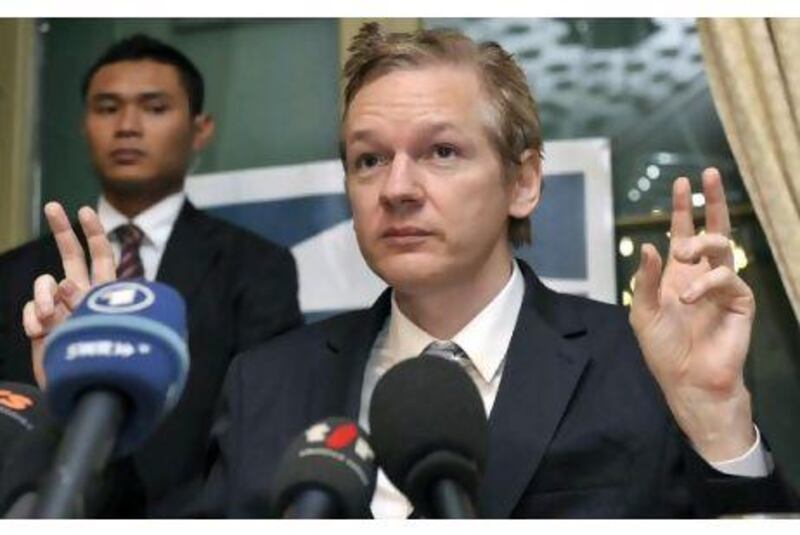WASHINGTON // With the latest WikiLeaks revelations continuing to reverberate around the world, dominating front pages from Denmark to Jamaica, US officials are still scrambling to downplay their significance.
US legal authorities, meanwhile, are investigating whether they have grounds to press charges against Julian Assange, the WikiLeaks founder.
For his part, Mr Assange has promised that the next batch of revelations from the whistleblower website will include leaks from private corporations that "could take down a bank or two".
Speaking to Forbes Magazine, Mr Assange also said that WikiLeaks has had to shut down its submissions site because it is receiving more leaks than it can publish.
"We have a publishing pipeline that's increasing linearly, and an exponential number of leaks, so we're in a position where we have to prioritise our resources so that the biggest impact stuff gets released first," Mr Assange said in the Forbes interview, published yesterday.
The impact of "cablegate megaleak" has yet to be fully felt. So far, little has been revealed that was not generally known, even if names were named and colour was added.
At a press conference Monday in Washington, Hillary Clinton, the US secretary of state, tried to downplay the diplomatic consequences of the leak, saying she was confident that "the partnerships that the Obama administration has worked so hard to build will withstand this challenge".
At the same time, however, she also, perhaps unwittingly, seemed to upgrade its significance from an unprecedented leak of classified diplomatic documents to "an attack on the international community - the alliances and partnerships, the conversations and negotiations, that safeguard global security and advance economic prosperity."
In doing so, Mrs Clinton was reflecting a tangible anger in the diplomatic community. David Mack, a former ambassador to the UAE and undersecretary of state for Near East Affairs under the first President Bush, said she had got it right in framing the leak as an attack on global diplomacy.
"All governments have an interest in their diplomats overseas being able to report candidly to their governments. It's the way you avoid misunderstandings and how you build intelligent policies," he said
Mr Mack also said the leak could have an impact on actual policy, specifically with regards to US efforts to contain Iranian influence in the Middle East, a topic that has been highlighted by the leak of cables suggesting many Arab countries are supporting such efforts behind closed doors.
"[The leak] is certainly going to jeopardise these efforts, at least to some degree," Mr Mack said yesterday. "Every one of these countries - and I include Turkey as well as the Arab countries of the Arabian Peninsula and countries in central Asia - want to have some kind of relationship with Iran.
"They don't want to provoke Iran into resorting to the kind of subversion that we saw in the early years of the Iranian revolution. They would prefer to be able to take these kinds of measures without having them suddenly become front-page stories that the Iranians can exploit."
The Washington Post reported yesterday that the US justice department and the Pentagon were investigating whether they could bring charges against Mr Assange under US federal espionage laws. No charges appear imminent, and any case could be complicated by First Amendment free speech protections.
Traditional US media are protected from publishing information gleaned from classified documents, even if such documents are regarded as stolen goods, as long as the documents came into their possession and were not obtained by their own criminal acts.
Moreover, Mr Assange, an Australian, is a non-resident foreign national, and the US, if it could bring a case, would also have to persuade another country to extradite him.
International human rights and press freedom organisations have yet to comment on the possibility of prosecution. In response to requests for comment yesterday, both Human Rights Watch and Amnesty International said they had yet to formulate a position, while Reporters without Borders, which has previously been critical of WikiLeaks, did not respond either
Mr Mack supports an effort to prosecute Mr Assange, though he concedes that it might be difficult. He also drew a very strong line between "responsible media" and WikiLeaks.
He said: "Julian Assange has stated on the record that he wants to harm the government of the United States. To a certain extent he has built the case for his own prosecution."






